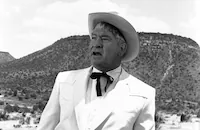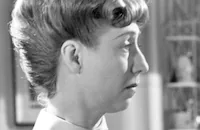Small Town Girl

Brief Synopsis
Cast & Crew
Leslie Kardos
Jane Powell
Farley Granger
Ann Miller
S. Z. Sakall
Robert Keith
Film Details
Technical Specs

Synopsis
In the small town of Duck Creek, Connecticut, all the friendly residents turn out for Sunday services, and enjoy listening to Cindy Kimbell, soloist with the church choir. Afterward, the Kimball family meal is interrupted when a policeman brings over Rick Belrow Livingston III, who was caught speeding through town. Adamant about safe driving and annoyed by the young man's flippant attitude, Cindy's father Gordon, who is the town's judge, sentences Rick to thirty days in jail. Rick's fiancee, Broadway star Lisa Bellmount, is disappointed that they must postpone their elopement, and promptly notifies the press. Rick is taken to the town's jail, and rumors of the rich, handsome inmate quickly spread among the local young women.
That evening, Rick watches from his cell as the town's young people gather across the street for a box social, and sees Cindy dance with her beau, Ludwig Schlemmer. Rick's mother arrives in her chauffeur-driven car and speaks to Gordon, but when he refuses to release Rick, she cheerfully agrees with his decision, and leaves without seeing her son. The bidding begins for the box suppers prepared by the young ladies, and Rick outbids Ludwig for Cindy's offering. Cindy reluctantly joins Rick in his cell, and defends the pleasures of small town life. The next morning, out-of-town photographers find Rick cleaning the sidewalk and snap a picture of him just as he impulsively pulls Cindy into his arms. Cindy then goes to her job at "Papa" Eric Schlemmer's dry goods store, where Ludwig, who dreams of being a Broadway dancer, also works. The picture of Rick and Cindy is on the front page of the paper that evening, and a jealous Lisa comes to town the next day.
After confronting Cindy, Lisa visits Rick in jail and reminds him that her birthday is a couple of days away. Desperate to get out of jail, Rick pretends to go on a hunger strike, and when that does not work, attempts to play on Cindy's sympathies by telling her it is his mother's birthday. Cindy persuades Happy, the jailer, to let the prisoner escape for the night, but insists on accompanying Rick on his visit to his "mother." They go to the elegant Livingston mansion in New York, where a formal gathering is in progress. After Cindy sings for the guests at Rick's request, his butler, Hemmingway, locks her in a fur vault while Rick slips away to watch Lisa dance in a Broadway musical. While visiting Lisa in her dressing room, Rick gets a call from Hemmingway, and when he learns that Cindy is in the extremely cold fur vault, he races home to help her. He then takes Cindy out for a night on the town, and romantic feelings overtake them.
They return to Duck Creek, with Cindy still wearing a mink coat from the vault, and when an astonished Happy sees them kiss, he immediately goes to Papa with the news. Papa awakens his son and says it is time he marries Cindy, but Ludwig protests that he is more interested in his dancing career. Papa nonetheless drags him to Cindy's house the next day and orders him to propose, and Ludwig is euphoric when she turns him down. Papa implores Gordon to parole Rick, but Gordon refuses until he sees the mink coat in the hall closet. Rick asks to serve his sentence, adding that he has come to like Duck Creek, but Gordon, concerned about the young man's engagement, insists that he leave town.
In New York, Rick goes to the theater to see Lisa, who has been keeping herself busy with other men in his absence. Backstage, he encounters Ludwig, who has come to the city seeking his big break. Rick is suddenly overcome with nostalgia for the small town he just left. That Sunday, Rick and his mother attend church services in Duck Creek, and he and Cindy gaze at each other as the choir joyfully sings.

Director
Leslie Kardos
Cast

Jane Powell

Farley Granger

Ann Miller

S. Z. Sakall

Robert Keith

Bobby Van

Billie Burke

Fay Wray

Nat King Cole

Dean Miller

William Campbell
Philip Tonge
Jonathan Cott
Bobby Hyatt
Rudy Lee
Beverly Wills
Gloria Noble
Jane Liddell
Nancy Valentine
Janet Stewart
Pegi Mcintire
Virginia Hall

Chill Wills

Roger Moore
Tyler Mcvey
James Holmes
Fred Datig Jr.
Robert Board
Michael Casey
Mel Pogue
Faire Binney

Marie Blake
George Tatar
Jody Hutchinson
Pat O'malley
Crew
Albert Akst
Jeff Alexander
Peter Ballbusch
Busby Berkeley
Nicholas Brodszky
Robert Brower
Dorothy Cooper
Dorothy Cooper
Cedric Gibbons
Bert Glazer
Sydney Guilaroff
George Frideric Handel
Henri Jaffa
Charles Jennens
Dorothy Kingsley
Emile Kuri
Joe Pasternak
Hans Peters
André Previn
Leo Robin
Helen Rose
Joseph Ruttenberg
Douglas Shearer
William Tuttle
Edwin B. Willis

Photo Collections
Film Details
Technical Specs

Award Nominations
Best Song
Articles
Small Town Girl (1953)
By Glenn Erickson

Small Town Girl (1953)
Quotes
Trivia
Notes
In the film, Farley Granger's character makes up lyrics for a birthday song sung to the tune of "Frère Jacques." According to a 1951 MGM News item, Ricardo Montalban was originally cast opposite Jane Powell. Pre-production items in Hollywood Reporter's "Rambling Reporter" column list Peter Lawford, Van Johnson and Dean Miller (who has a small role in the film) as candidates for the role of "Rick Belrow Livingston." Hollywood Reporter news items also report that country western singer Hank Williams was to make his film debut in this picture, and that Robert Burton had been cast, but Williams was not in the film and Burton's appearance has not been confirmed. Granger was borrowed from Samuel Goldwyn Productions for the film. According to information in the file on the film in the MPAA/PCA Collection at the AMPAS Library, two additional songs written by Nicholas Brodszky and Leo Robin, "You're Asking for It" and "Willie the Whippoorwill," were submitted for PCA approval but were not included in the film. The film received an Academy Award nomination for the song "My Flaming Heart."
Small Town Girl features two well-known dance sequences that are frequently discussed in books and included in documentaries on film musicals. The first is a dance solo, set to an instrumental version of "Take Me to Broadway," in which Bobby Van hops through town in what appears to be one continuous tracking shot. In the second number, "I've Gotta Hear That Beat," Ann Miller dances on a Broadway stage accompanied by an orchestra of disembodied musicians, whose instruments are played by hands that emerge from the floor and wall.
According to a 1955 news item in Los Angeles Examiner, producer Alexander Pall brought a $900,000 plagiarism suit against M-G-M, claiming that Small Town Girl had taken its plot from his original story, "Peaceville in Trouble." M-G-M made another film called Small Town Girl in 1936, based on a novel of the same title by Ben Ames Williams. Although the 1953 film is sometimes erroneously referred to as a remake of the 1936 film, they actually bear only a slight resemblance to each other.

Miscellaneous Notes
Released in United States on Video May 23, 1990
Released in United States Spring April 10, 1953
Released in United States Spring April 10, 1953
Released in United States on Video May 23, 1990














